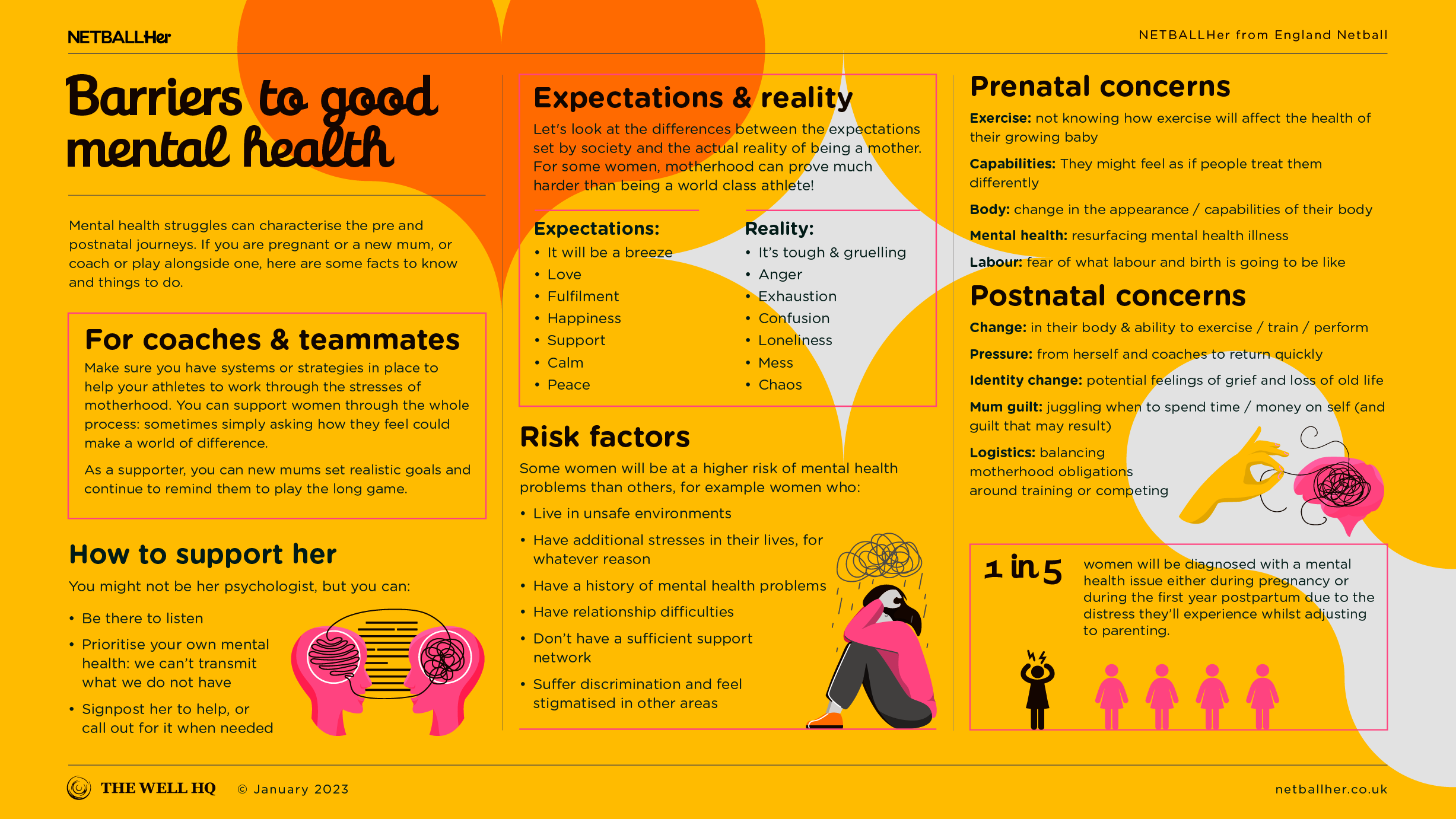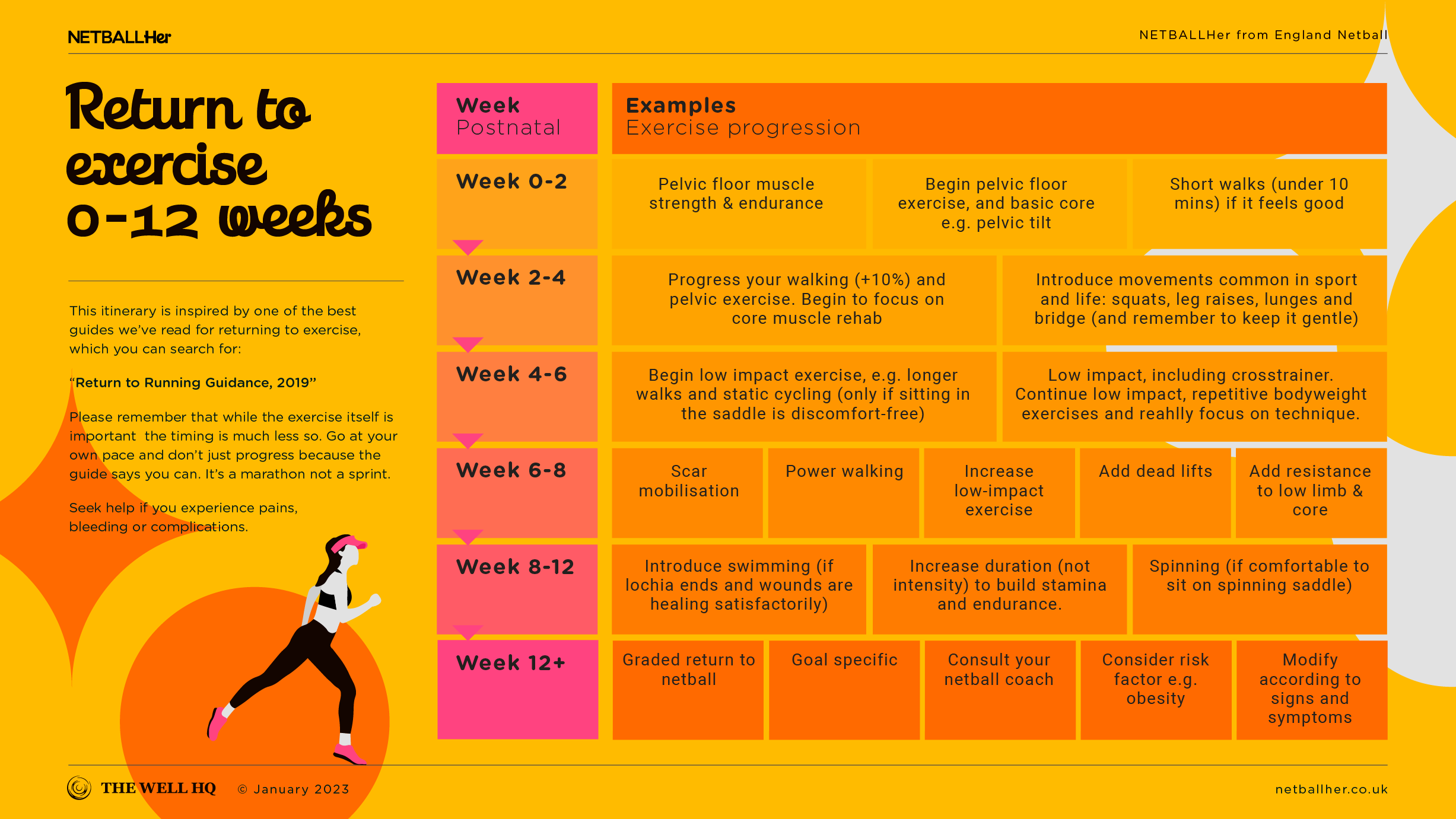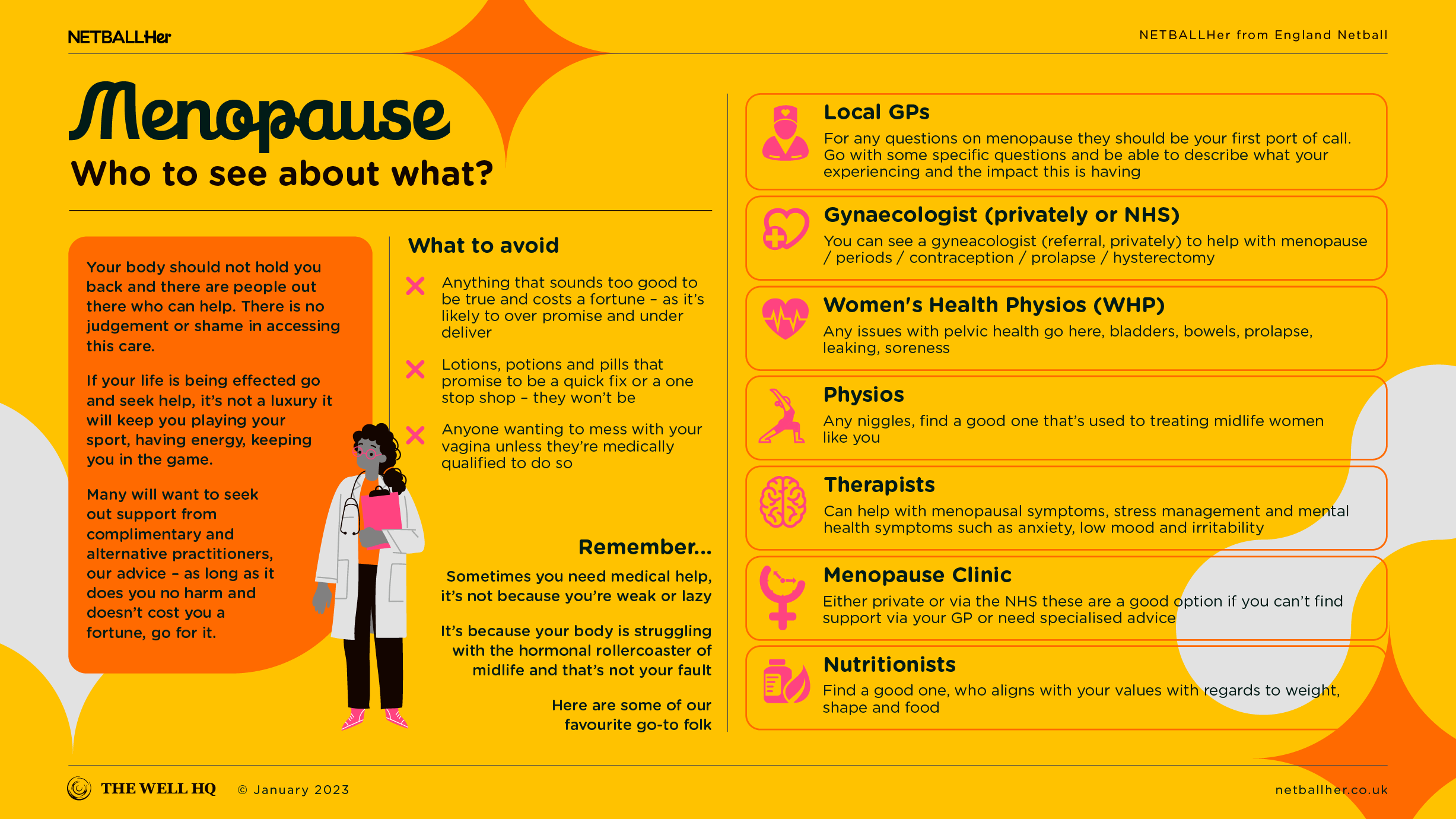Click play for an audio readthrough of this article
Some of the unique mental and emotional challenges in puberty, pregnancy, postnatal, and menopause – and how her netball family can help
This article, though not exhaustive, points at common mental health challenges synonymous with puberty, pregnancy & postnatal, and menopause, and we bend its themes towards the experiences of active girls and women.
First up, please note that if you or someone you know are suffering a mental health challenge then contact a relevant healthcare professional as soon as possible.
#1. Puberty
Symptoms: eating disorders, body image issues, mood swings, anxiety, depression, lethargy, volatility, self-esteem, disillusionment with sport …
By now you know that two in three (65%) girls will completely abandon sport during puberty, and self-esteem and mental health issues are massive contributors to that fact.
This dropout situation is problematic for numerous reasons, but a primary tragedy here is that these same girls probably won’t henceforth take advantage of exercise as a frontline defence against physical and mental health issues.
Feelings, changes, questions …
Puberty. It’s a perfect storm of internal, external and coming-of-age factors with the potential to throw a girl’s entire sense of who she is and her place in the world out of whack.
Add lumps, feelings, spots, hair and curves (where there weren’t before lumps, feelings, spots, hair and curves) and we commonly see self-esteem issues, fear, anxiety, depression, mood swings and so on flare up.
This is mostly normal, but it’s a normal that can, if not spotted, acknowledged and addressed, lead to actions and decisions which set her off-course.
Mental health meets dropout
Back to the dropout stats. Imagine a grassroots under 12s netball team comprising 15 girls. In just a handful of years only five players will remain.
It’s pretty dramatic, and some of the reasons why sit squarely at the crossroads of sport and mental health. We’re not necessarily talking glaring mental health issues but often subtler, coming-of-age issues and decisions that reshape her view on her, on her body and on exercise.
For example, periods are sore – especially in the early days. They can also be uncomfortable, embarrassing and a significant cause of anxiety; not least around leaking. Hence a girl may determine it’s easier to stay off court, and sit out this time.
Okay. Maybe the parents or coach aren’t armed with the facts or confidence to question her decision. She sits out again. The adults in her life may not know that exercise is one of nature’s best painkillers, or that exercise endorphins will help her mood, or that period pains may be managed via sleep, lifestyle, diet and over-the-counter meds.
If the above are unknown and all goes unsaid then a girl may conclude that her body is a liability; a source of discomfort and embarrassment. Sitting out becomes a regular thing and the drift is on.
The same dynamic plays out in other areas. For example, budding breasts can be tender, sore and a source of embarrassment. Faced with a training session, she might fear pain or being on display or a bit of both. In a world where sports bras are barely promoted, and she perhaps has to wear figure-exposing kit, sitting out becomes the easier, softer way.
Cue the drift, then the dropout.
Eating disorders
Body image issues in puberty aren’t uncommon and active girls have a particularly tough time. They’re liable to grow frustrated and disillusioned with their changing bodies because girls in puberty do, for a time, actually lose strength, co-ordination and balance.
It’s a temporary part of the chemical process but can nonetheless feel like a real injustice, especially as boys their age enjoy a new surge of testosterone-fuelled growth, strength and speed.
With that, some athletic girls go to great lengths, subconsciously or otherwise, to try and arrest the changes. Underfuelling, overtraining, disordered eating patterns – her response to her body’s changes could be very dangerous for her overall health now and going forward.
According to Johns Hopkins research, eating disorders are most common from the age of 12 onwards. And while eating disorders are an equal opportunities threat for all girls, we do need to keep a special eye on sporty high achievers and girls with perfectionist tendencies.
Solutions
Do everything in your power to keep her showing up to netball.
- Spread knowledge
- Urge they track periods and try to manage symptoms
- Support them via appropriate kit (sports bras, dark uniforms)
- More Caught Short Kits (and access to them)
- Coaches / parents / teachers who can ACT BRAVER in key conversations
- Spotting irregular eating / training patterns
- Ask questions (with kindness)
Check out the Puberty section on NETBALLHer for so much more.
#2. Pregnancy
Pregnancy symptoms: anxiety, low mood, low self-esteem, negative self-talk, battered confidence …
Carrying a child. Society and popculture build it up to be one of the most miraculous and liberating experiences of a woman’s life. Sure, it can be those things, but …
It’s estimated that one in five women will be diagnosed with a mental health issue either in pregnancy or in year one of motherhood. According to the NHS, depression in pregnancy affects more than 1 in 10 women, while symptoms during pregnancy may include anxiety, panic attacks and even psychosis.
Those risks can all increase based on the circumstances, history and home life of the mum-to-be.
Small confidence is a big concern
The primary mental health risks and challenges for pregnant women tend to centre on the fear of what’s going on and what lies ahead. We know that many pregnant women, especially driven women, give themselves a hard time for not living the fantasy. Pregnancy should be all unicorns, fluffy clouds and pink rainbows, shouldn’t it?
We find sporty and high achieving women are particularly susceptible to bouts of anguish and low-mood in pregnancy. While some women soar through the changes, the weight gain, the swollen ankles and the constant need to pee, others may feel utterly deflated that they’ve lost control of their body. Cue confidence and self-esteem issues.
Sporty women may worry they’ll never get their body, or peak fitness, back ever again and this deepens if she, rightly or wrongly, begins to lose her game, make mistakes, or feels that other people are treating her differently – like she’s sick or weak or less-than.
What we have, potentially, is an active woman who loses her sense of control, confidence and maybe even identity. If left unchecked then social fears, opt-out from sport, negative self-talk and even depression are at the end of the road. Once-active mums drop sport much more easily than dads after becoming parents.
Solutions
Keep them involved in netball. Even if they don’t want to play, make sure they show up for the social and community aspects of the sport they love. Keep them part-of.
- Knowledge
- Signpost to health professionals if necessary
- Attentive peers who show an interest
- Being able to train safely (ideally with an expert on-side)
- Help her manage her expectations
#3. Postnatal
Symptoms: postnatal depression, mum-guilt, anxiety, low-mood, isolation
We’ve all heard of postnatal / postpartum depression, which impacts more than one in ten new mums (and new dads too).
The idea that this is a less severe type of depression has to be smashed especially because, in many ways, it often creeps in much more gradually than other forms of depression and it packs more of a punch given this should be the happiest time of life, right?
Then there’s issues tied up in the physical recovery from pregnancy. It takes a long time. Active women often feel it takes too long and / or they are pressured into returning before they’re ready. For that, they may pay a high emotional price as well as a physical one.
Body and return anxieties
The key mental health challenges we’ll touch on here live in the realities of being a mum, and the transition / struggles in getting back to life and training.
First thing to say is that being a new mum is painted as pink and lovely and wonderful. Every baby noise should feel like a spiritual experience, so says Instagram. But when the reality of sleeplessness, chaos, mess, noise, stress hits home, many women feel they’re failing. This can be a lonely and even desperate place to be that’s compounded by bad sleep, stress, physical pain …
Identity crises at this lifestage shouldn’t be underplayed. Where women were previously in-control, autonomous, and somewhat defined by their work, or sport, or fitness, or social life, being stuck at home cleaning poop can be pretty shattering.
Further, active women are more likely to show competitive character traits (tough-mindedness, dominance and aggression) but as mums they may have to lose these traits and, again, that means turning the volume down on who they are. Or were.
Without having realistic expectations around life, and around the timeline to a return to exercise, new mums often measure themselves against an impossibly high bar. My body isn’t healing; fitness isn’t returning; babyweight isn’t shifting …
These pressures and expectation do little more than cause alarm and frustration and stress. Potentially depression and anxiety.
Mum guilt and the practicalities
Mum guilt might sound a bit watery but it’s real. The inner voice telling you you’re selfish or a bad mum for taking time out is a poisonous and insidious narrative we simply can’t afford to let in. Usually, this toxic voice belongs to other people and another time.
It can become a self-defeating cycle. Don’t go out because of mum guilt, don’t reap the benefits from exercise or time with your netball family and feelings of isolation and despair deepen, you stay inside more. Cue more time to listen to that nasty inner voice.
We’ve just touched on won’t go out but there’s also can’t get out. When new mums don’t have the right support around them then even getting out and about to reconnect with the world can seem impossible.
This can be another real source of frustration, desperation and despair. No mum is an island. Without help, or the right kind of help, new mums often find they’re on a slippery slope. They need to reconnect with the world, and they need to be able to, too.
Solutions
Get practical in the support you offer to new mums. Lend a hand (or a car or a lift) and make sure she knows her netball family are there for her.
- Help her set realistic expectations
- Listen
- Signpost professional health support where necessary
- Be a friend
- Allow her to return at her own pace (ideally with an expert on-side)
- Ensure she can feel part of the team even if she’s not physically involved
#4. Menopause
Symptoms: low mood, anxiety, depression, social fear, stress, more stress, negative self-talk, lack of trust, lack of confidence, insomnia, suicidal thoughts …
Menopause so often begins not with the classic hot flushes and brain fog but with anxiety, low mood, bad sleep, and a rush of crippling stress.
For decades, perhaps forever, women have largely suffered in silence with the big dump of mental and emotional issues delivered at the dawn of the menopause. Typically, when symptoms appear they’re downplayed or normalised by the individual and those around her.
They’re put against the stresses of life, or work, or family or … anything really.
But the truth is, without help and support we know the suicide stats for women in menopause are shockingly high. So are the quit my job stats. So are the exercise is no longer for me stats.
All of this is alarming. It’s also frustrating because if menopause was in the frame as soon as mental health issues appear, women would be able to engage with treatment options and solutions much earlier on.
So remember: mental health plus midlife often (not always) equals perimenopause.
Hormones
We say it over and over but women’s hormones are wonderful, miraculous things. They regulate, boost and protect the female body during our fertile years, and that also includes the brain.
Hormones such as oestrogen, progesterone, testosterone, melanin and so on have a long-established pattern that contributes to a woman’s sense of ‘normal’. That means physical normal, and it means mental normal.
Essentially, a woman’s brain has calibrated itself to her hormone supply. In plain English, that means hormones take care of her. They play a huge part in regulating her cognitive function, decision-making, resilience, emotions, stress, sleep and so on.
As we know, perimenopause, the first of the three menopause stages, is synonymous with wild and volatile hormones. We’re all quick to point to the physical repercussions (hot flushes etc) … but less so the mental and emotional ones.
But consider it again: the brain has gotten used to (over 30-odd years) a sense of normal. Hormones contribute to that normal. Unable to rely on those hormones – sometimes there’s too much, other times not enough – the brain struggles to maintain stability and that’s often a very strange and scary place to be.
Stress and the stress of stress
The body’s natural defences against stress are sleep, oestrogen and progesterone. Exercise too. But with sleep starting to erode, hormones fizzling out, and exercise starting to become a source of worry / pain / embarrassment, it’s all a pretty gnarly cocktail destined to pack a punch on a midlife woman’s mental and emotional wellbeing.
Then there’s life stress, family stress, work stress, sleep stress, stress stress … it’s a recipe for, well, stress.
We mentioned exercise. During midlife, there may be extra sweat and leaking. Bones are weakening, muscles are thinning and brains are stuttering. It’s temporary, but all this can seriously cripple a woman’s sense of what she can do on-court or in the gym.
Without a lot of mental toughness – which can be difficult to summon during perimenopause – or a supportive group of peers by her side, her self-esteem may hit bottom. She’ll feel anxious and unconfident in herself and her body …
And sooner or later it may seem easier to just not bother.
A quick medical history
Spoiler alert, when you get down to the solutions section, we’ll focus on HRT which NICE (the UK body that defines medical best-practice) calls the ‘first line defence’ for midlife women.
That’s good, but you maybe know that HRT still has its critics. Much of this is because we’re still in the tailwinds of a piece of bad research that muddied the picture, the use and the facts around HRT.
To explain: in 2002, the first Women’s Health Initiative (WHI) study went to print earlier than planned to raise alarm about HRT and its “significant risks” of things like breast cancer and heart disease.
It took a decade for these claims to be revised, revoked and described as “melodramatic”, but damage was done and a generation of doctors – many practicing today – studied at a time HRT was (and is) the devil.
It’s not. Replacing those hormones which regulate body and brain is one of the best ways to taper into perimenopause without it taking a dramatic toll on a woman’s mental as well as physical health.
Solutions
Again, having her netball family to support her is huge. Having her netball family ensure she stays in the game on and off court will be massive as she makes the transition. Oh and a trip to the GP for a diagnosis is essential.
- GP visit (menopause diagnosed / ruled out)
- HRT
- CBT and talking therapy
- Exercise
- Mindfulness and meditation
- Access to fans / temperature-controlled environments
- Extra toilet breaks
- Peers / colleagues more in-tune with what she’s going through
- Considerate clothing
- Access to Caught Short Kits
There’s so much more on the Menopause section of NETBALLHer so why not head there now.
As a reminder, the content of the course belongs to The Well HQ. You have permission to access and use the content yourself or, if you are an organisation, for the number of users selected, but are not otherwise permitted to share such content with others, all in accordance with our Course Terms and Conditions.



